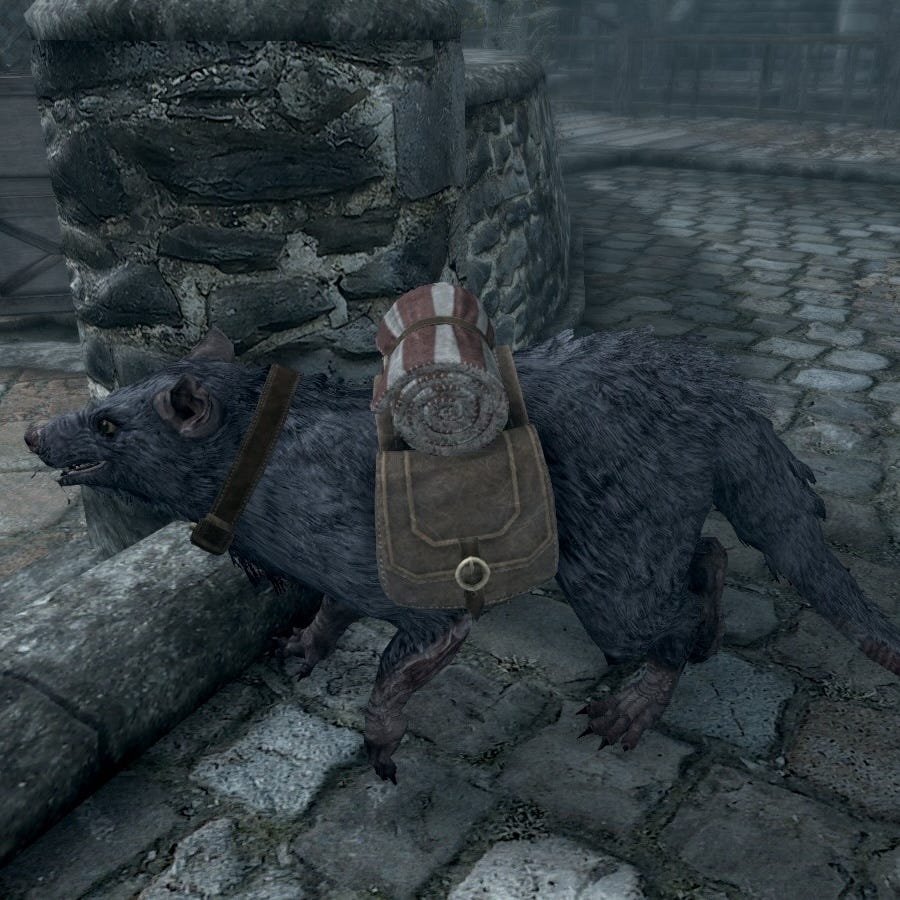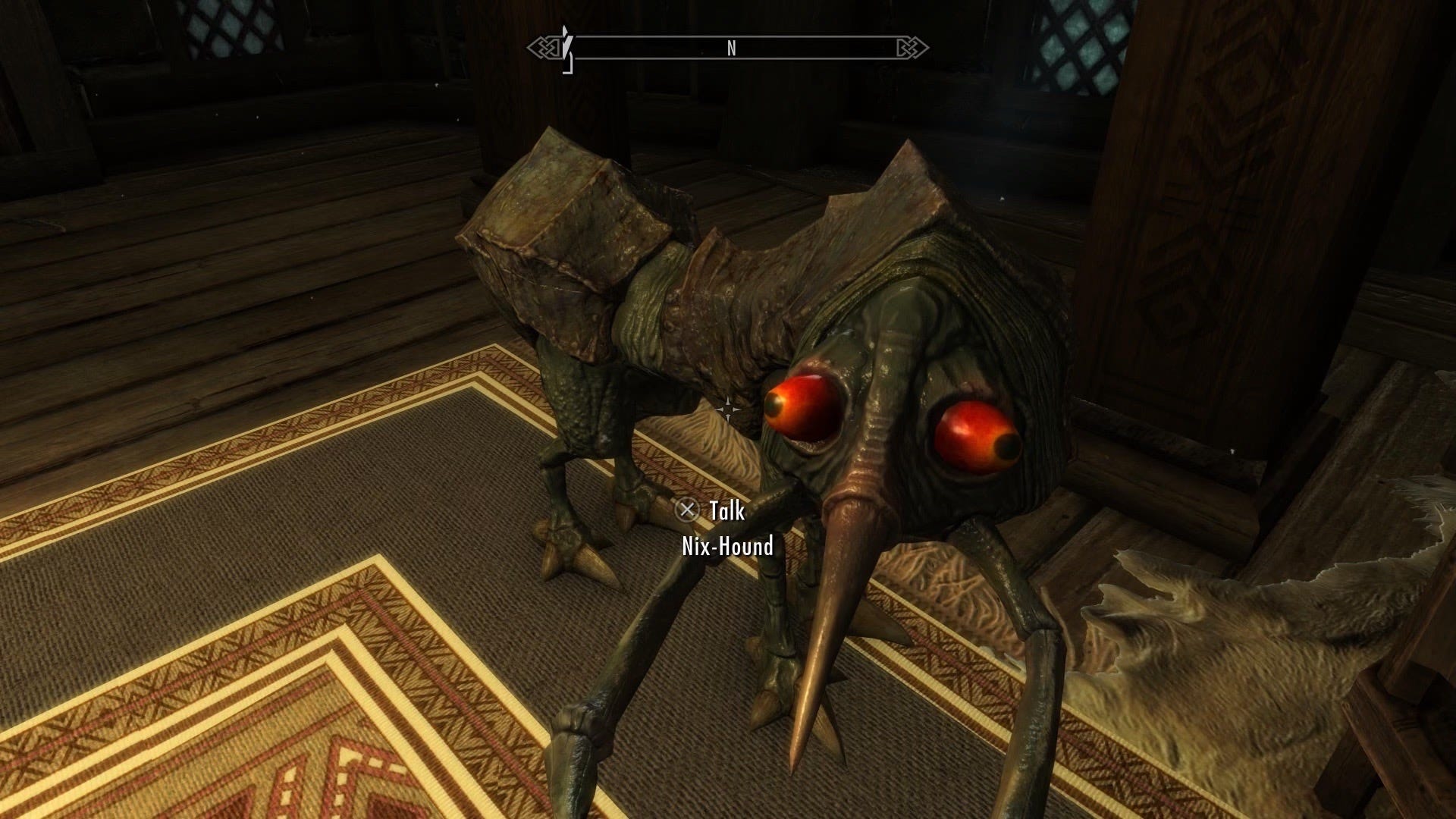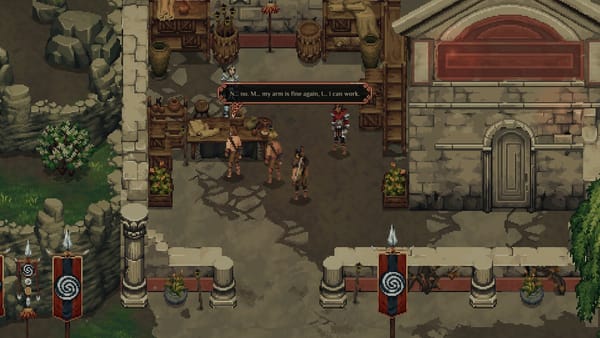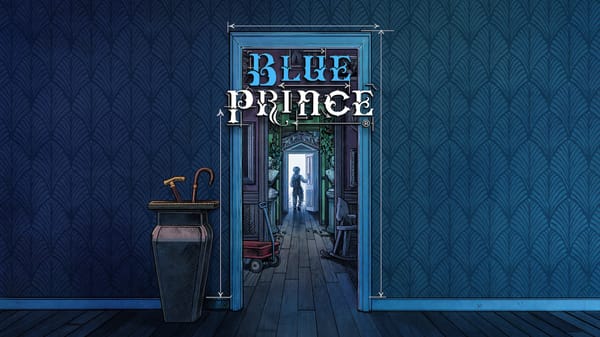Skyrim and a life ignoring destiny
Don’t speak to me or my rat-son ever again
I always get to things late. I discover pop songs after they’ve been out for months. Movies when they’re old news. The only reason I know of any games that are of-the-moment is because Grayson has the RSS feed for Polygon piped directly behind his eyelids. [Editor’s Note: I accept this insult because of its undeniable accuracy.] Appropriately, then, I came to The Elder Scrolls V: Skyrim just in time for the 10th Anniversary Edition. This release incorporates not only all the DLC ever released for the game, but a range of content that the game’s “Creation Club” gradually released into the world over the years. For a newcomer, experiencing all of this material at once, it takes what was already a content-rich world at launch and develops it into gaming’s deepest rabbit hole.
I’ve played a raft of open world games during the pandemic: The Witcher 3, Horizon Zero Dawn (and Forbidden West), Elden Ring. But none have encouraged a sandbox experience quite like Skyrim, whose main quest I largely ignored for dozens of hours.
Skyrim centers around a character called the Dragonborn fulfilling their destiny and fighting dragons. Throughout the game, the scaly foes swoop overhead and rain down hellfire until you deal with them. As I became further and further detached from the main quests of the game, these random attacks took on the feel of a narrator’s voice insisting I return to the core of the experience. Stray too far from the path, and a dragon was there to remind me of the story I was nominally supposed to be playing.
I had expected the lure of these side quests, of off-the-wall, self-made narratives,1 but I underestimated the ways in which they would cohere into their own metanarrative, the degree to which the Skyrim journey would ask me to live many such lives. Most games of this genre incorporate some sort of experience and leveling systems. Typically your characters grow from killing monsters. Skyrim presents your character as a blank slate, and they instead grow by using particular skills. Killing things in general does not matter so much as, say, killing them with a bow so that your archery improves. Sneaking while doing so might similarly shape your tabula rasa into not only an archer, but a stealthy one at that. It’s an ingenious system that helps to draw out your own gaming narrative.
At first, I took the path of the stealth archer. Like many, I was drawn to the screwball comedy of becoming virtually invisible to inept guards by hiding behind columns. A gun for hire, I eventually fell in love with one of my companions,2 married them, and settled down. Perhaps because my wife and I, in real life, are navigating the tumultuous real estate market, I found comfort in buying property in game. Twelve properties, to be exact. After each quest we would return home to mount my new magic weapons and armor on the wall in a type of rogues’ gallery telling the story of our adventures. By the fire curled Skritch, the giant monstrosity of a pet rat that I had adopted. Our adopted human orphan reluctantly swept the hearth, as bidden. Life was good.

After one battle with a skeletal warlord, I could not find my partner in life and adventure. I scoured the dungeon everywhere and was shocked to find her corpse. Shock because, as a rule, the game automatically revives your companions upon death—unless they die by your own hand. Dated graphics didn’t matter: my grief was immediate. I had accidentally cut short our little family narrative with a stray fireball. Friendly fire had left me a widower. In a game full of consequences, where your narrative choices can reshape the world, I was moved by this complete accident. There was nothing left to do but reclaim our wedding ring and exit the tomb, where I was immediately beset by a dragon.
Skyrim encourages you to write your own life narrative, but it discourages walking a single path. Skills cap at a certain level. Stick too closely to any one strategy—the wizard that hurls fireballs, the sword and shield, the stealth archer—and you will stagnate. Growth requires you to reinvent yourself.
As the seasons changed, so too did my own relationship to the in-game life that unfolded. Quest after quest brought more trophies for my wall. Skritch was joined by a cute rabbit and some sort of demonic spider thing.

I gave up the life of the stealth archer to wield double magic swords. My adopted orphan swept the hearth next to a chair that would always remain empty. I did eventually find another companion that I wished to marry, but in Skyrim, like certain denominations of Christianity, divorce is final, no matter the circumstances. Just as there is no way to revive a dead companion, you cannot marry again. Instead, I wore all black and roamed the countryside as a grieving widower of a werewolf with my new, platonic vampire companion.
The game opens with you proclaimed as the Dragonborn and given the burden of destiny. But, for me, that destiny became an afterthought. After I completed the main quest, I kept adventuring, filling out my many homes with treasures and ornaments. When I finally felt that I had my fill and was ready to delete the game, I returned home, ready to ease into domestic life. A dragon swooped down from the sky, ready to do battle. As nearby guards and merchants ran out to do battle with it, I instead took off my armor, settled into a porch chair with Skritch at my feet, and told my adopted (human) child to keep sweeping.
I had seen my future foretold by the reddit thread of a mother, new to video games, who gave up the path of the Dragonborn to set up a lucrative and meticulously researched potions business. ↩
Oh, and turns out she was a werewolf. ↩



